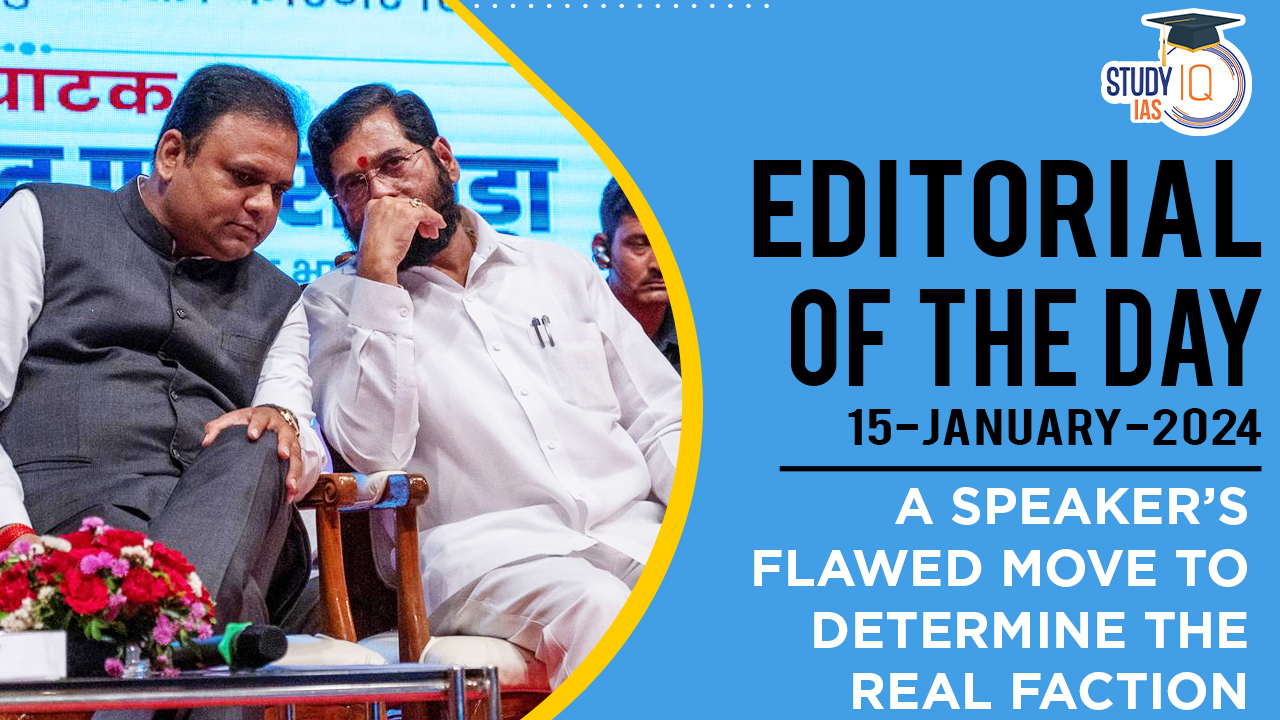Table of Contents
Context: The Maharashtra Assembly Speaker’s verdict is facing legal and constitutional scrutiny alleging that this verdict contradicts SC’s interpretations and is unconstitutional.
The Verdicts Of The Speaker
- Recognition of Shinde Faction as Legitimate: The Speaker determined that the Shinde faction was the legitimate Shiv Sena, based on the party’s 1999 constitution submitted to the Election Commission of India (ECI).
- Majority Support for Shinde Faction: The Speaker noted that the Shinde faction had the majority support of 37 out of 55 MLAs at the time of the emergence of the rival factions on June 21, 2022.
- Dismissal of Disqualification Petitions Against Shinde Faction: The Speaker rejected the disqualification petitions filed by the Uddhav Thackeray-led Shiv Sena UBT faction.
- Questioning the Authority to Summon Meeting: The Speaker questioned the authority of Sunil Prabhu from the Shiv Sena UBT to summon the meeting on June 21, 2022.
- Non-attendance Not Grounds for Disqualification: The Speaker concluded that the non-attendance of Shinde faction members at the meeting summoned by the UBT faction could not be grounds for their disqualification.
We’re now on WhatsApp. Click to Join
Tenth Schedule: An Overview
- Introduction: The Tenth Schedule was added to the Indian Constitution in 1985 through the 52nd Amendment, aimed at enhancing political stability and maintaining party integrity.
- Addressing Political Defection: The primary purpose of the Tenth Schedule, also known as the anti-defection law, is to address the issue of political defection, a key element in parliamentary democracy.
- Disqualification Criteria: It sets out the conditions for disqualification of members of Parliament and state legislatures, focusing on defection.
- Members are disqualified if they voluntarily give up their party membership or defy the party’s directive (whip) by voting contrary to it or abstaining.
- Preventing Whimsical Party Switching: The Schedule aims to prevent elected representatives from arbitrarily switching parties, which can lead to political instability and betray the electoral mandate.
- Original Exemptions: Initially, the Tenth Schedule provided two exemptions from disqualification:
- If one-third of a party’s legislators form a breakaway faction, and
- In case of a party merger supported by at least two-thirds of its members.
- Removal of the Split Provision (2003): The 91st Constitution Amendment in 2003 eliminated the split provision, leaving only the merger clause as an exemption from disqualification under the Tenth Schedule.
- Rajendra Singh Rana vs Swami Prasad Maurya (2007): In this case the Supreme court said that joining hands with the opposition to form an alternative government was considered as voluntarily giving up party membership.
Controversy and Legal Overreach in Speaker’s Judgement on Shiv Sena Factional Dispute
- Neglect of Omitted Split Provision: The Speaker’s judgement seems to grapple with the issue of factional splits in Shiv Sena, ignoring the fact that the split provision was omitted from the Tenth Schedule by the 91st Constitutional Amendment in 2003.
- Misinterpretation of Merger Provision: The Speaker appears to have misinterpreted the merger provision, which is the only exemption from disqualification under the Tenth Schedule. This provision demands the merging of the defector’s party with another, under stringent conditions, which the Speaker seems to have overlooked.
- Overstepping in Determining ‘Real Party’: The Speaker overstepped his jurisdiction by attempting to determine the ‘real’ Shiv Sena. The authority to decide party legitimacy lies with the Election Commission of India under paragraph 15 of the symbols order, not with the Speaker.
- Contradiction with Judicial Precedents: The Speaker’s judgement contradicts the Supreme Court’s findings in the Subhash Desai vs Principal Secretary, Governor of Maharashtra (2023) case, particularly regarding the recognition of Eknath Shinde as leader and Bharat Gogawale as Chief Whip, which the Court deemed illegal.
- Exceeding Authority in Party Leadership Matters: The Speaker exceeded his authority by attempting to resolve internal party leadership disputes. The Tenth Schedule’s role for the Speaker is to decide on defections from the original party, not to intervene in internal party leadership issues.


 GPS Spoofing and Its Impact in India: A ...
GPS Spoofing and Its Impact in India: A ...
 Amrit Gyaan Kosh Portal: A Comprehensive...
Amrit Gyaan Kosh Portal: A Comprehensive...
 UpLink Initiative: Launched by World Eco...
UpLink Initiative: Launched by World Eco...





















